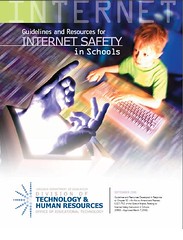Larry Magid in the San Jose Mercury News on the limits of the age verification proposals being discussed to protect kids online. A quote:
Some attorneys general want to see the electronic equivalent of showing an ID at the door. . . But Sentinel Chief Executive John Cardillo told me age- and identity-verification schemes typically rely on credit reports and other data that is accessible for most adults but generally not available for people under 17. One could, in theory, access school, birth or Social Security records, but for a variety of good reasons, these databases are off-limits to private entities. . . . [E]even if age verification is possible, I still question whether it’s desirable. I worry about some teens – including victims and youths questioning their sexual identity – being harmed because they’re denied access to online support services that could help them or even save their lives.
Arguments concerning age verification and showing harm from restricting minors’ access to the Internet were made in challenging provisions of the Communications Decency Act restricting “indecency” online back in 1997/1998. At the time, age verification was judged impracticable, and the Supreme Court’s ruling upholding free speech rights online in some part rested on this conclusion. If age verification proposals now move forward, the issue might be revisited again.
Free speech rights are some of the healthier provisions of the Bill of Rights protection. But the area of minors continues to be troublesome. The challenges to the “indecency” laws are made on behalf of members of an adult audience; they are in effect restricted to child-safe material even though the law only is intended to protect kids. Almost everyone seems to accept without question the premise that such challenges may not be brought on behalf of the children themselves. The lack of attention to this point seems to stem, first, from observation that of course children do not have rights to free speech as against their parents or other private caretakers. I tell The Grub to hush, he must hush, or I will give his racetrack a time-out. But this power of parents and their delegates is a common law matter. It ought to have nothing to do with the resolution of the constitutional question, regarding the free speech rights of kids as against the government.
One now contends with a second argument: It is common sense that children (differently for different ages) must have different rights than adults, they are not all at the same stage of development and so on and so on. Again, the same objection. One is not dealing with the common law of contracts here. This has to do with constitutional rights. The constitution says “Congress may make no law….” It is a restriction on the power of government. It gives government no special powers with respect to minors. If in fact Congress has such powers, where does it get them? If it can get them somewhere else, what is the limit?
Imagine if one made the “children can’t possibly have the same rights as adults” with respect to other provisions of the Bill of Rights. The anti-establishment clause for example. Government may not establish a religion for adults, but if we read exceptions into the Bill of Rights for children, evidently it *can* establish such a religion for children? That is nonsense. Similarly the right against self-incrimination. It is not okay for the police to torture adults, but if we are to read exceptions in the Bill of Rights against children, evidently it is okay for the the police to torture children? More nonsense. May Congress take the property of children without compensation? Subject them to cruel and unusual punishments? It seems to me that if the answer to any of these questions is “no,” then it must be “no” to all of them (including, to the outrage of many, to the right to bear arms and the right to trial by jury). Congress has no more powers over kids than it has over adults. May the next free speech challenge to age verification will be brought on behalf of the kids themselves.
Much hemming and hawing and lawyering will follow. I know, I know.
 The debate over social networking safety is increasingly tied up with the question of whether (and how) users should be authenticated before they are allowed onto a social networking site, however that term of art is defined. Age verification proposals have been flying for the last two years that would use a variety of approaches to determine the age / identity of users. [I have discussed those proposals in detail here.]
The debate over social networking safety is increasingly tied up with the question of whether (and how) users should be authenticated before they are allowed onto a social networking site, however that term of art is defined. Age verification proposals have been flying for the last two years that would use a variety of approaches to determine the age / identity of users. [I have discussed those proposals in detail here.]



 The Technology Liberation Front is the tech policy blog dedicated to keeping politicians' hands off the 'net and everything else related to technology.
The Technology Liberation Front is the tech policy blog dedicated to keeping politicians' hands off the 'net and everything else related to technology.